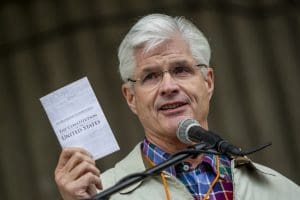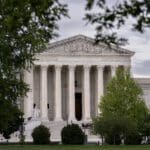Michigan state Senate candidate closely connected to Republican dark money groups
Daylen Howard hired a political operative who is behind dark money groups pouring millions into multiple ballot drives.

Daylen Howard, a Republican running in Michigan’s 28th state Senate District, employed consultants with close ties to several nonprofits that are under investigation over their funding of ballot initiatives.
A campaign finance complaint filed in May 2021 by election lawyer Robert LaBrant alleges that Michigan Republican Senate Majority Leader Mike Shirkey used “dark money” through the nonprofits — Unlock Michigan, Michigan Citizens for Fiscal Responsibility, and Michigan! My Michigan! — to fund legislative efforts to roll back executive powers used by Democratic Gov. Gretchen Whitmer in response to the COVID-19 pandemic.
In June, Secretary of State Jocelyn Benson referred the complaint to the attorney general’s office for criminal investigation after she found reason to believe a violation had occurred.
LaBrant’s complaint alleges that the nonprofits, which have funded ballot initiatives on election reform, public health, and education, were in breach of the state’s Campaign Finance Act, which requires campaigns to reveal their donors. Funding the campaigns via nonprofits evades that requirement, keeping the money “dark.”
Howard, who is running against former Michigan state House member and former East Lansing Mayor Sam Singh, paid Bright Spark Strategies over $14,000 for in-house consulting and campaign expenses in 2022, according to campaign finance reports. The firm says that it offers “full service campaign solutions,” including strategy, fundraising, compliance, research, and lobbying.
Bright Spark Strategies founder and finance director Heather Lombardini is a Republican activist who holds official positions with the groups Michigan Citizens for Fiscal Responsibility, Michigan! My Michigan! and Michigan Guardians of Democracy. The organizations funneled large amounts of money into Unlock Michigan, the ballot initiative campaign that successfully rolled back the governor’s executive powers.
The contributions of the three nonprofits made up almost 90% of funding of the ballot initiatives, raising legal questions because nonprofits are allowed to spend money on political issues only as long as those issues are not their primary focus.
“Unlock Michigan is not a spontaneous grassroots effort to repeal the law granting a Michigan governor emergency powers. Unlock was conceived by Senator Mike Shirkey to achieve his political goal of repealing that law, a plan executed by his agents under his direction and control, and funded with his dark money,” LaBrant’s complaint says.
Tracy Wimmer, a spokesperson for the Michigan Department of State, told the Detroit News that “following the groups’ refusal to enter into a conciliation agreement the department referred the matter to the attorney general.”
LaBrant’s complaint alleges that Shirkey raised nearly $2 million for Unlock Michigan, with the nonprofits acting as a ballot proposal campaign without having to disclose donors. Michigan! My Michigan! gave $550,000 to the initiative. The money was then shifted to the campaign. Together, the three nonprofits gave a combined $3.3 million to Unlock Michigan.
“Shirkey used dark money on a scale never seen before in Michigan,” LaBrant alleges.
The organizations also channeled major donations to Secure MI Vote, a ballot initiative that would restrict mail-in ballots, tighten voter ID requirements, and prohibit private donations to fund elections. Of $841,000 raised by Secure MI Vote in 2021, $750,000 came from Michigan Guardians of Democracy.
After the success of the first Unlock Michigan campaign, the organizers founded a second dark-money operation targeting public health initiatives in the state.
Unlock Michigan 2 was a successor campaign to overturn a 1978 public health law that gives the governor emergency powers. In May 2022, its organizers decided not to put it on the ballot in November, preferring instead to attempt to overturn it through legislative efforts in 2023. The campaign had employed the same funding technique, using money from nonprofits that do not have to reveal their donors.
Howard, Lombardini and Shirkey did not respond to requests for comment.
Published with permission from The American Independent Foundation.
Recommended

Rosenblum, other Democratic AGs ask SCOTUS to block red state bans on emergency abortions
Oregon Attorney General Ellen Rosenblum and nearly two dozen other Democratic-led states urged the U.S. Supreme Court to preserve the ability of emergency room doctors to provide abortions, arguing that failing to do so would have devastating effects for their health care systems and women across the country.
By Gloria Rebecca Gomez, Arizona Mirror - April 01, 2024
Ken Paxton paid $2.3 million to defense lawyers for impeachment trial
The lawyers were paid from his campaign, according to a report filed this week.
By Patrick Svitek, The Texas Tribune - January 18, 2024
Texas governor and attorney general do little to curb state’s chemical plant crisis
Republicans Greg Abbott and Ken Paxton have taken thousands of dollars in donations from chemical companies and their affiliated PACs.
By Jesse Valentine - December 08, 2023









































































